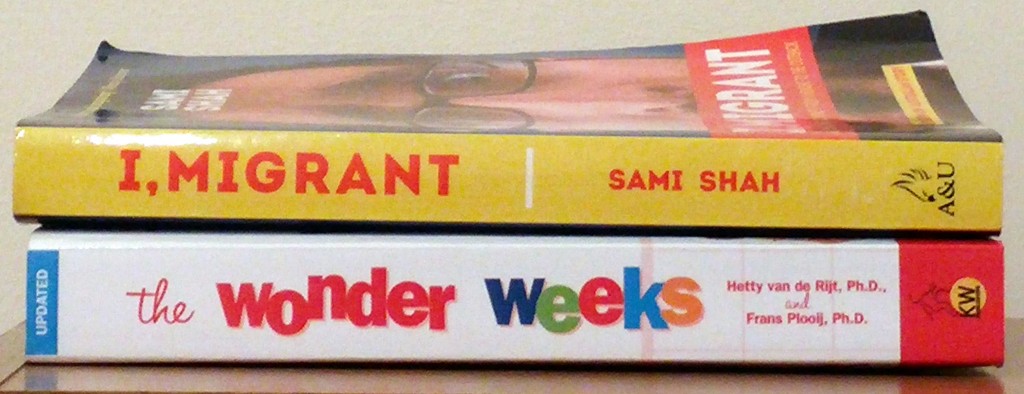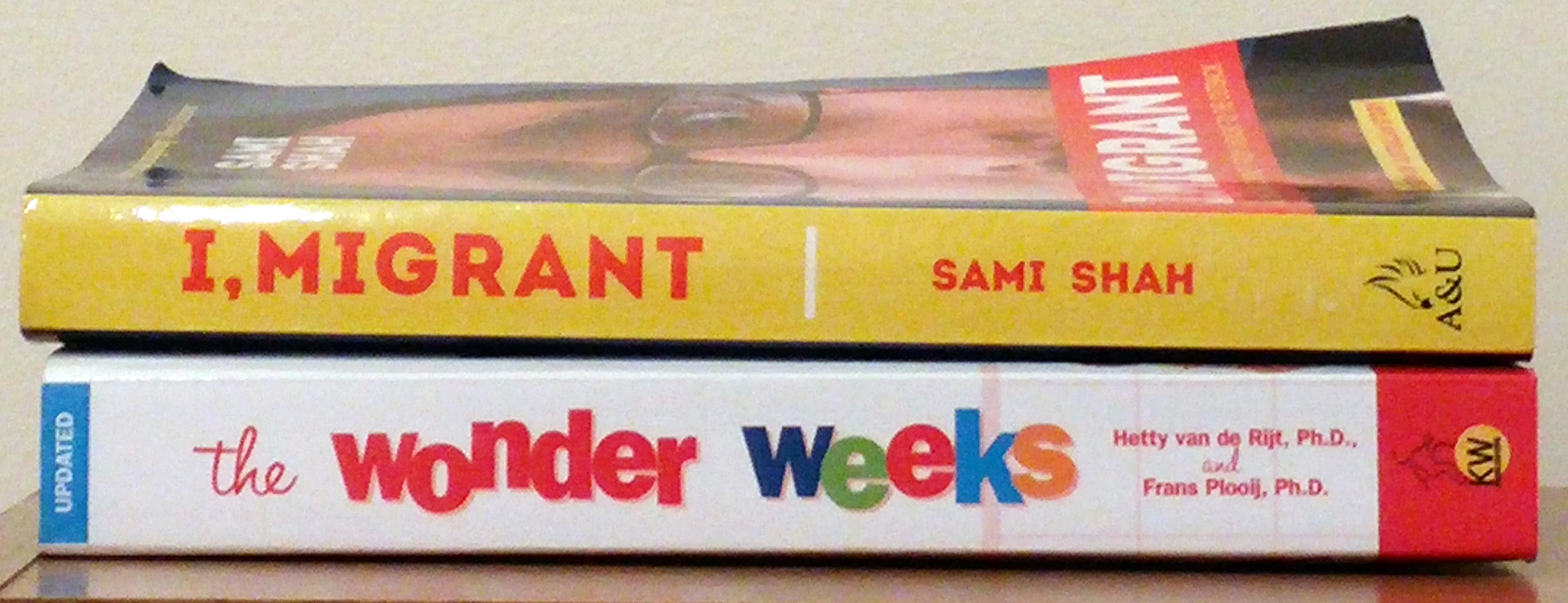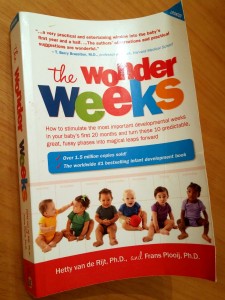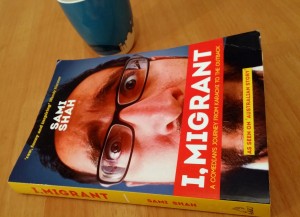Now that Nael is growing up (boo-hoo but yay?) and I get a little break while he crawls around and plays on his own, I’ve managed to find time to read again. Granted I can rarely read more than a half a page at a time, but it is something. Besides all the parenting material I’m constantly reading online, this month’s reads include The Wonder Weeks and I, Migrant.
TL;DR – it was a good month of reading.

Hetty van de Rijt and Frans Plooij
This book is a permanent fixture on my dinner table (since we don’t have a coffee table yet, lazy us). Nael has recently started his fifth leap so I’ve been reading the relevant chapter on it whenever I can. My sister introduced me to the Wonder Weeks and gave me this book when Nael was born and it’s seriously the best baby present ever. In fact it’s now on my list of presents to give to new parents because it’s such a sanity-saver.
Anybody who spends time on parenting forums such as on Baby Centre would be familiar with the wonder weeks phenomenon or at least the term “leap”. This book is based on Frans and Hetty’s research on 10 developmental phases which infants go through between birth and twenty months. Referred to as “leaps”, these developmental phases are age related and represent periods over which babies master new skills while at the same time turning into crazy little screamers.
During these leaps, babies become clingy, terribly cranky, stop sleeping properly and basically everyone around them has a miserable time. This is because they are mastering new skills, their brains are in overdrive and they are having a hard time adjusting to changes in the world as they perceive it. So when your baby is screaming away for hours on end for no apparent reason and refusing to sleep, there are very high chances that he or she is going through a leap. It’s not “pait main dard” or “milk not suiting him” or that he’s a “ronay wala baccha with a goad ki aadat“. There’s all this great research to back up the fact that it’s all completely normal. In fact I’ve even got my ever-skeptical husband round to talking about leaps as well. Although the fact that Hetty and Frans are researchers from Cambridge is probably the major reason he takes this stuff seriously (he’s a snob that way, yes).
The book really helps you get some perspective on what’s going on with your child during these tough phases. There’s a chapter on each leap which tells you signs typical of that leap as well as what the mother is likely feeling at the time. I especially love the anecdotes from different mothers because they are always so relatable and sometimes make me laugh out loud because they are just so real. Such as this one:
“My immediate reaction is a furious desire to slap him. Before I had him, I couldn’t understand how people could hit their children. Now I can.”
There’s great solace in knowing that dark thoughts creep into most mothers’ minds during these frustrating phases, something we all are probably horrified to admit.
It’s fun going through the checklist of skills your child may be picking up which are given in each chapter so that you know what to expect. The best part is seeing your child do the smallest of things for the very first time, just like you had read in the book. The chapters also include ideas for games and activities which you can do with your child so it’s really helpful that way.
What the book doesn’t include are tips on how to “fix” your child or how to make him stop driving you completely bonkers. That’s because you can’t do anything except help your child get through these phases, mostly by spending more time with them and being patient (pretty much impossible, I know). Basically, read this book because it gives you hope. Hope that you aren’t the only one going through a tough time with your child and that both of you are soon going to come out on the other side to a cheerful, fun baby (only briefly though).
If you still aren’t sure whether this book is for you, go through their website here and it should definitely make you curious. There’s an iPhone and Android app for the Wonder Weeks as well but apart from keeping track of exactly how old Nael is in weeks, I didn’t really find the app useful.
So if you are a new mother, just read this book for some much needed sanity.
Sami Shah
Everyone has a story to tell. Each person’s unique set of circumstances and life experiences can make for very interesting stories if told the right way. This is what Sami Shah has done in his memoir, spinning the story of his life into an immensely readable, laugh out loud book. Yes I actually laughed out loud several times, the husband can vouch for it.
I’ve wanted to read this book since it came out last year, but it wasn’t available in Pakistan. I forgot all about it until I came across his show Beginners Guide to Pakistan on BBC Radio 4 which you can currently find on the iPlayer. The first episode was really fun to listen to so I went ahead and ordered his book.
Sami Shah writes about his time as a journalist, working at an ad agency, his journey to becoming a comedian, a bit about his childhood and migrating to Australia. It’s a pretty regular life of a Karachiite that he writes about, but with a generous dose of dark humor. The book is neatly split into sections covering different phases of his life, the best bits being the ones about his time as a journalist and life in Karachi.
The book begins well and instantly had me hooked. It does get a bit boring in the middle when he gets into details about his wedding and such, because I mean we all know Pakistanis tend to have overly stretched weddings and there can be nothing new or funny about that. There were also certain details which were offputting to the prude in me. You’ll know what they are when you read it. And read it you must because the book is pretty, pretty funny. The weirdness is made up for later on in the book by some hilarious anecdotes from his childhood and then his story of moving from Karachi to Australia. You will crack up at things like the author getting molested by the maulvi, then pause when you realize what a terrible thing it is that you are laughing at. And then you’ll resume laughing.
You know a book is great when you miss it just a little bit when you finish it. What I really liked about the book was the writer’s honesty. Self-deprectating humor can be really irritating if overdone, but in this book’s case it came across as very genuine. Not many people possess the ability or self-assurance to laugh at themselves, which is why this book is so relatable. Most of us have had our awkward and ridiculous phases which we’d rather forget about, but here is someone writing about it at ease and laughing at himself. Then the frustration and anxiety which he expresses about life in Karachi, the sense of doom enveloping us all over there, really resonated with me. He also talks about his struggles as an immigrant, being unemployed and his job searching woes, all things which most people aren’t very open about. It’s all very real.
I do wonder if the book’s appeal may be limited to Karachiites who can relate to the guy’s story. And some of the reviews on Goodreads indicate that many jokes in the book are repeated from his stand-up comedy shows so perhaps not entirely new then. I haven’t ever seen those so I wouldn’t know. Some of the jokes were certainly repeated on his BBC radio show, like the dictators and mustache one. Doesn’t matter though because the book is thoroughly entertaining. Highly recommended.



